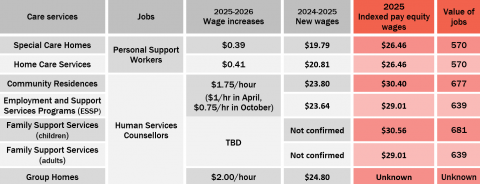Moncton — The New Brunswick Coalition for Pay Equity welcomes the provincial government’s investments in care worker wages for a seventh consecutive year, and the first under this new government’s mandate. While these investments recognize that the quality of care depends on the quality of work, the Coalition stresses that they are insufficient to achieve pay equity.
The 2025–2026 budget includes $20 million in wage increases for care workers:
- $7.5 million for Personal Support Workers (PSWs)
- Home Care Services ($0.41/hr)
- Special Care Homes ($0.39/hr)
- $7.3 million for Human Service Counsellors ($1 in April and $0.75 in October)
- Community Residences
- Employment and Support Services Programs (ESSP)
- $3.5 million for Community-Based Care workers ($1 in April and $1 in October)
- $2.6 million for Adult Specialized Services ($1 in April and $1 in October)
“These are welcome investments that show this government is willing to act. It’s a good start, but without a clear plan to achieve pay equity, care workers are still being left behind,” says Raphaëlle Valay-Nadeau, Chair of the New Brunswick Coalition for Pay Equity. She notes that while the government has promised to adopt pay equity legislation for the care sector, workers are still waiting for a clear commitment.
“We’re encouraged by these investments, but we need legislation that will set out a timeline and a roadmap to finally reach pay equity,” adds Valay-Nadeau.
The Coalition remains concerned about the situation of Personal Support Workers (PSWs). For the second consecutive year, they are receiving only a 2% wage increase, amounting to about $0.40 an hour or less — an increase that does not even keep pace with inflation.
"Personal Support Workers are the backbone of our long-term care system, yet their wages continue to stagnate. If this trend continues, they will fall even further behind, both in relation to inflation and in achieving pay equity. We must do better to finally recognize and value their essential work," emphasizes Valay-Nadeau.
Investments in the wages of care workers (2025-2026)

This growing wage gap is already having serious consequences. Hundreds of hospital beds are filled with patients who should be in long-term care, but staffing shortages mean that some facilities cannot operate at full capacity. “This situation clearly shows how wages impact services. You cannot have quality care without quality jobs. Equitable wages will help recruit and retain the workers who provide these essential services,” explains Valay-Nadeau.
The gaps to reaching pay equity are now between $4.96 and $6.67 an hour — the closest we have ever come. This important progress is the result of years of advocacy by care workers, care associations, and sustained investments by successive governments.
"But we cannot stop halfway," adds Valay-Nadeau. "Care workers deserve more than promises — they deserve action. We are closer than ever to achieving pay equity, and now is the time for the government to pass legislation that will finally make it a reality."
The Coalition has requested clarification from Social Development on which services and workers are covered and is still awaiting a response.
– 30 –
